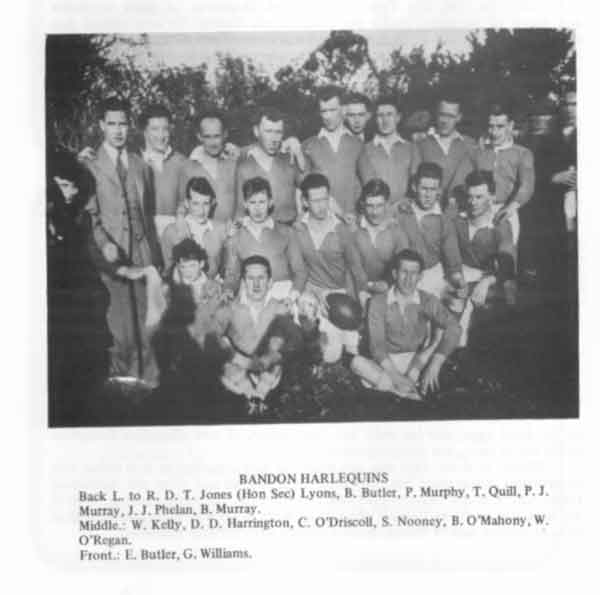Bandon Harlequins
The club fell on bad times in the mid 1930's and ceased to play for a few seasons. Some young enthusiasts then set about forming a team but not without some difficulty as Cecil O'Driscoll, St. Patrick's Quay, recalls: -
"Bandon in 1937/38 was at a low ebb in its fortunes, not least because of the economic war; emigration was rife and, of course, so was unemployment. The Rugby Club had gone out of existence. Yet at this depressing time, a few of us got together, many of whom had never played rugby, and using the old Devonshire Arms Hotel as a base, began to revive the Club. The Headmaster of the Grammar School, a Mr. McCutcheon, kindly consented to become President, at a time when many who were obvious candidates for the job did not particularly want to know us. He gave us great encouragement and T.D. Jones (whose brothers perhaps are much better known) became an excellent and determined Hon. Secretary. (though he never played the game). Tim Quill of the old team turned out with us and his presence gave us faith in ourselves.
We ran dances, including a Dress Dance, in the Devon, as well as a famous concert in the Town Hall and were able to buy a ball and set of jerseys. Our fixtures list was non-existent; we arranged matches when and where we could. At this particular time teams in country towns were very thin on the ground. The old pitch at the top of Cork Road, known in earlier days as Walsh' field, was not available to us, so we played some matches in a field owned by Morgans at the back of Kilbrogan Graveyard.
A Change of Name.
Later on, the late Paddy Murphy of Monarone, a great supporter and player of the game, kindly put a field at our disposal. We were advised that it might be better not to be seen as the lineal descendants of the old club which had gone out of existence because the Statute of Limitations took six years to run. In the circumstances,- we choose to call ourselves the Bandon Harlequins. It was in Kilbrogan that we played a full Constitution Cup team, which, if not of vintage quality, still included such good players as Ned O'Connor, Ned Murphy and one or two of the Barrys, as well as the late Jimmy Reardon who played Centre for Ireland.
This was to be a warm-up for Con's Cup Campaign but to everyone's surprise, not least our own, we beat them and scored tries to do it. The late Sean Murphy, a good friend of ours, was referee in his "Sunday Suit" and was definitely more neutral to us than to the visitors. Another match provided novel opponents and in -its own way was historic; it took place in the early summer of 1938 against the British Garrison in Fort Camden. It was played on the Army Ground above Crosshaven. The Garrisons at Forts Camden and Carlisle always had useful players, some of whom played with a Cork Senior Club and yet we won 17-3 with a neutral referee on this occasion.
Only a few weeks later the Union Jack was hauled down and the Tri-Colour hoisted over the Forts at Camden, Carlisle, Spike Island, Castletownbere and Lough Swilly as the Irish Army took over and the Army of Occupation left after 800 years. Bandon would certainly have been the last team of "natives" to meet the British Army in friendly combat before they left. Needless to add, we were treated most hospitably; even if the fare consisted of dried eggs, powder milk and beer which, if not altogether congenial to the native taste, was decidedly cheap.
Rugby in those days was not nearly as well organised as it is today, but nevertheless it was great fun. Anything could happen and often did. Individual talent had a much better opportunity to flourish, probably because, even if we were not as fit as today's players, we were in no way programmed and in spite of relative lack of fitness, serious injuries were virtually unknown. "We played for a few more seasons" recalls D.D.Harrington, "but travel was restricted as there was little petrol available due to the war, and when the club began playing again in 1949 I was the only survivor of the Bandon Harlequins team who lined out with the new team". Cecil O'Driscoll went on to win three Senior Cup medals with Constitution and he captained their cup winning team in 1946. He was also capped for Munster on 15 occasions.
